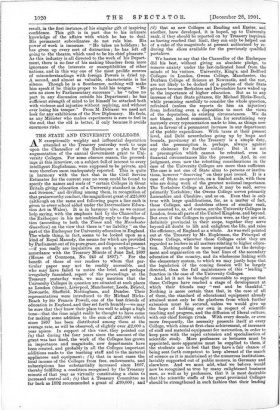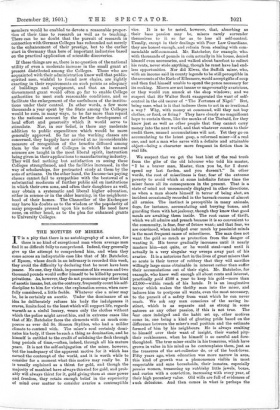THE STATE AND UNIVERSITY COLLEGES.
AN exceptionally weighty and. influential deputation attended at the Treasury yesterday week to urge upon the Chancellor of the Exchequer a plea for the augmentation of the annual Government grant to Uni- versity Colleges. For some obscure reason, the proceed- ings at this interview, on a subject full of interest to every intelligent Englishman, were supposed to be private, and were therefore most inadequately reported. This is quite in harmony with the fact that in the Civil Service Estimates for the current year no room could be found to specify the names and seats of "certain Colleges in Great Britain giving education of a University standard in Arts and Science," and dividing among them, in recognition of that praiseworthy conduct, the magnificent grant of £25,000 (although on the same and following pages a line each is given to every school aided under the Intermediate Educa- tion Act in Wales). It is in harmony also, as we cannot help saying, with the emphasis laid, by the Chancellor of the Exchequer in his not unfriendly reply to the deputa- tion (according to both the Times and the Manchester Guardian) on the view that there is "no liability" on the part of the Exchequer for University education in England. The wholething, in fact, seems to be looked upon as a kind of Royal Maundy, the means for which are provided by Parliament out of its pure grace, and dispensed at present —if you really are inquisitive on such a subject—" in accordance with the Treasury Minute of June 2nd, 1897 (House of Commons, No. 245 of 1897)." For the benefit of those of our readers to whom that par- ticular paper may not be readily accessible, and who may have failed to notice the brief, and perhaps irregularly furnished, report of the proceedings at the Treasury yesterday week, we may mention that the University Colleges in question are situated at such places as London (three), Liverpool, Manchester, Leeds, Bristol, Newcastle, Sheffield, Nottingham, and Dundee. Their representatives were introduced to Sir Michael Hicks- Beach by Sir Francis Powell, one of the best friends of education in England, and they set forth humbly—we may be sure that they knew their place too well to adopt a high tone—that the time might really be thought to have come for making some addition to the awn of £25,000 which since 1897 has been distributed among them at the average rate, as will be observed, of slightly over £2,000 a year apiece. In support of this view, they pointed out (a) that during the -four years since the amount of the grant was last fixed, the work of the Colleges has grown in importance and magnitude, - new departments have been created, and probably in all the Colleges important additions made to the teaching staff and, to the material appliances and equipment; (b) that in most cases the local income of the Colleges from fees, endowments, and subscriptions has substantially increased since 1897, thereby fulfilling a condition recognised by the Treasury minute of that year as virtually constituting a claim to increased central aid ; (c) that a Treasury Committee so far back as 1892 recommended a grant of £30,000; and (d) that as new Colleges at Reading and Exeter, an another, have- developed, it is hoped, up to University rank, if they should be reported on by Treasury inquirer' as having reached that limit, they can only be helped out of a cake of the magnitude at present authorised by re. ducing the slices available for the previously qualified partakers.
We hasten to say that the Chancellor of the Exchequer did his best, without giving an absolute pledge, to remove anxiety under the last-indicated head from the minds of his visitors. University, King's, and Bedford Colleges in London, Owens College, Manchester, the Durham College of Science at Newcastle, and the rest, are not likely to be docked. of a portion of their State pittance because Berkshire and Devonshire have waked up to the importance of higher education. But as to any increase of that State pittance, Sir Michael Hicks-Beach, while promising carefully to consider the whole .question, refrained (unless the reports do him an injustice) from indicating even a disposition to meet the views of the deputation, in existing circumstances. We do not blame, indeed commend, him for scrutinising very narrowly every representation made to him, as things now are, in favour of a permanent increase in any department of the public expenditure. With taxes at their present level, and Debt nevertheless going up by leaps and bounds, parsimony at the Treasury is a simple duty, and the presumption is, perhaps, always against any claimant for further outlay. But it is not a presumption which cannot be rebutted, even in financial circumstances like the present. And, in . our judgment, even now the rebutting considerations in the case of the University Colleges are more than sufficient The case is not one of State alms to persons or institu. tions, however " deserving " on their past record. It is a case of State co-operation, on a limited scale, with those who are doing work of the greatest national importance. The Yorkshire College at Leeds, it may be said, serves primarily Yorkshire; the Owens College serves primarily Lancashire and Cheshire; and so on. Even that is only true with large qualifications, for, as a matter of fact, these Colleges, and doubtless others of similar rank, are resorted, to, as, of course, are the University Colleges in London, from all parts of the United Kingdom, and. beyond. But even if the Colleges in question were, as they are not, definitely provincial in their scope, together they serve beyond all doubt to lift and enlighten the life, and raise the efficiency, of England as a whole. As was well pointed out at the Treasury by Mr. Hopkinson, the Principal of Owens College, wherever these Colleges exist they are regarded as leaders in all matters relating to higher educa- tion. Nothing could be more important to the develop- ment and organisation on the best lines of the secondary education of the country, and its wholesome linking with the elementary system, to which we may justly hope that the legislation of the coming Session will be largely directed, than the full maintenance of this " leading ' function in the case of the University Colleges.
And let it not be thought reasonable to suppose that these Colleges have reached a stage of development at which their friends may "rest and be thankful." Nothing is more certain than that, in the case of all of them, the standard of educational equipment already attained must only be the platform from which further extension must be secured, unless we would give up the hope of holding our own in respect of scientific teaching and progress, and the diffusion of liberal culture, with our chief foreign rivals. With every decade, or even more frequently, the necessity presents itself at every College, which aims at first-class achievement, of increases of staff and material equipment for instruction, in order to keep pace with the rapid extension and specialisation of scientific study. More professors or lecturers must be appointed, more apparatus must be supplied to them, if the students are to feel that they have a fair chance of being sent forth competent to keep abreast of the march of science as it is maintained at the numerous institutions, lavishly supported out of public moneys, in Germany and elsewhere. And we must add, what we believe would now be recognised. as true by many enlightened business men, as well as by professors, that it is most desirable that the scientific staffs of the great provincial Colleges should be strengthened in such fashion that their leading
members would be enabled to devote a reasonable propor- tion of their, time to research as well as to teaching. There can be no doubt that the pursuit of research in connection with.German Colleges has redounded not merely to the enhancement of their prestige, but to the earlier start in Germany than here of important industries based on the practical application of scientific discoveries.
If these things are so, there is no question of the national utility of even a moderate increase in the small grant at present distributed among the Colleges. Those who are acquainted with their administration know well that public- spirited men, wishful to found new chairs, are rightly exacting in their requirements on such points as adequacy of buildings and equipment, and that an increased Government grant would often go far to enable College authorities to meet such reasonable conditions, and so facilitate the enlargement of the usefulness of the institu- tions under their control. In other words, a few more thousands a year spent by the State among the Colleges would be sure, in many ways, to be far more than repaid to the national account by the further development of local effort and generosity which it would serve to stimulate. Nor, in our belief, is there any moderate addition to public expenditure which would be more generally approved. So far as the working classes are concerned, they happily have arrived at no inconsiderable measure of recognition of the benefits diffused among them by the work of Colleges in which the natural sciences are taught in the most liberal spirit, instruction being given in their applications to manufacturing industry. They will feel nothing but satisfaction in seeing these Colleges strengthened, and the facilities increased, in the way of scholarships, for protracted study at them by the sons of artisans. On the other hand, the Income-tax paying classcs cannot fail to sympathise with the bestowal of a substantial modicum of further public aid on institutions in which their own sons, and often their daughters as well, may obtain a systematic and liberal higher education, either in science or in the older learning, in the neighbour- hood of their homes. The Chancellor of the Exchequer may have his doubts as to the wisdom or the popularity of many proposals pressed upon his notice. He need have none, on either head, as to the plea for enhanced grants to University Colleges.



































 Previous page
Previous page